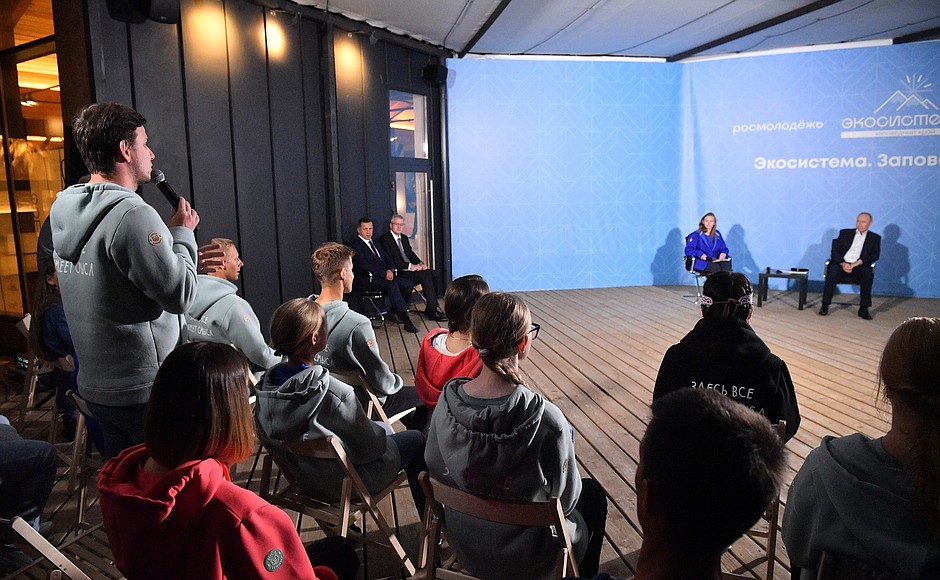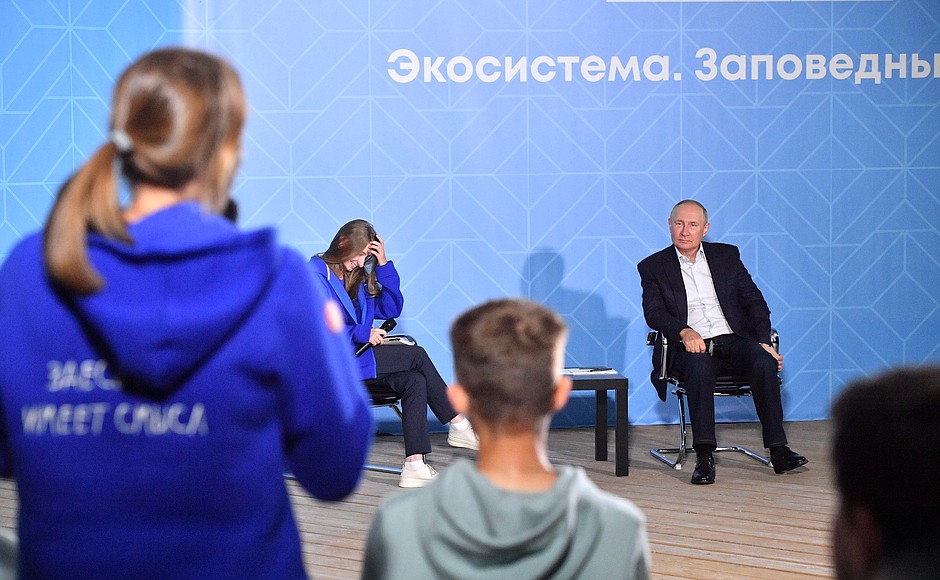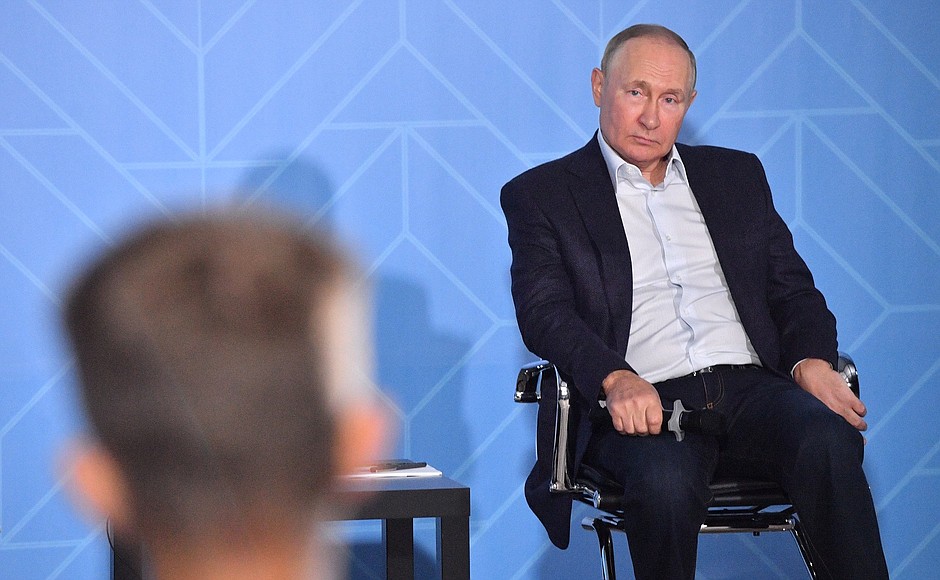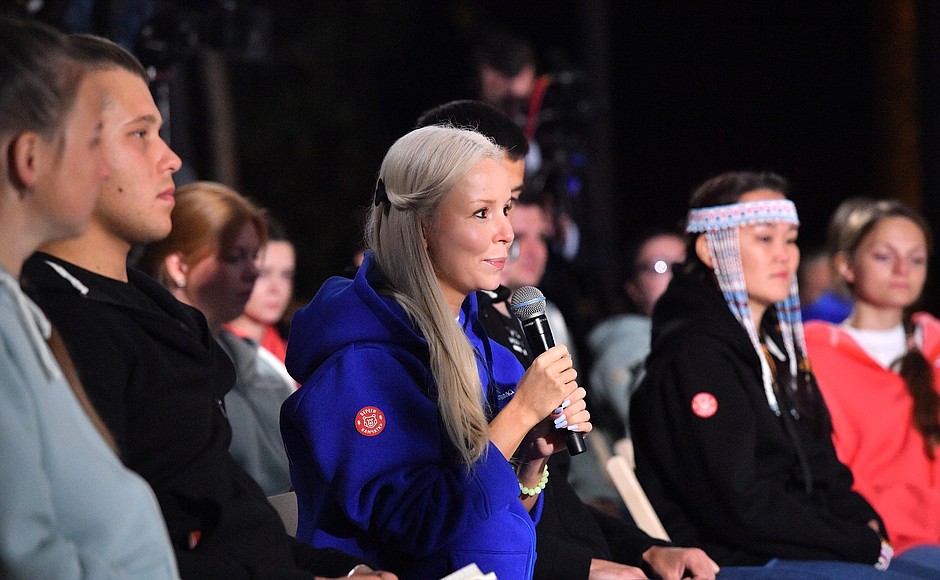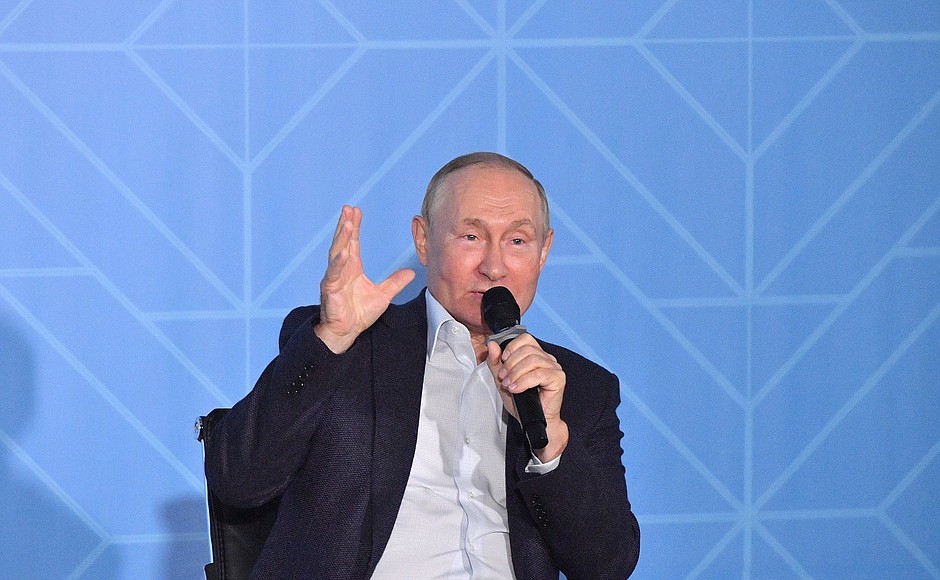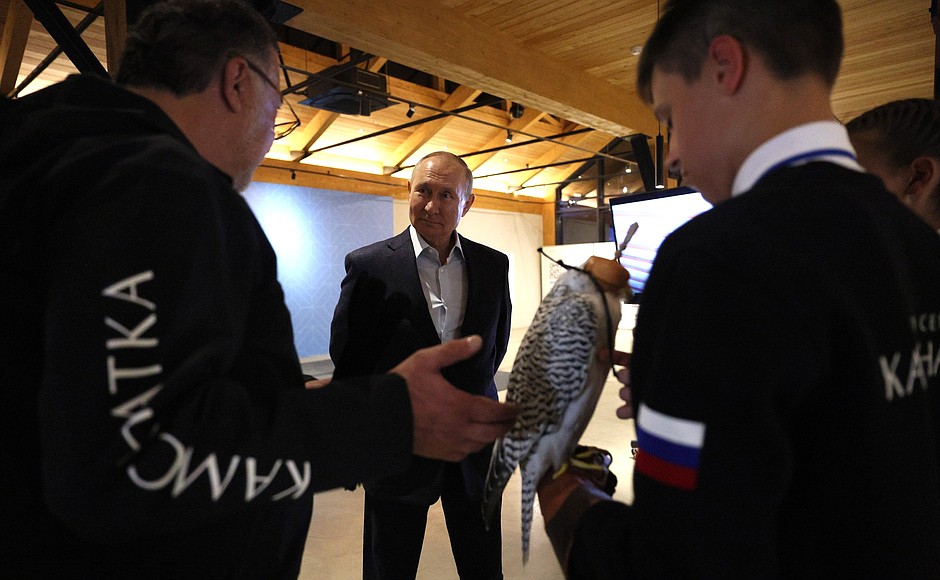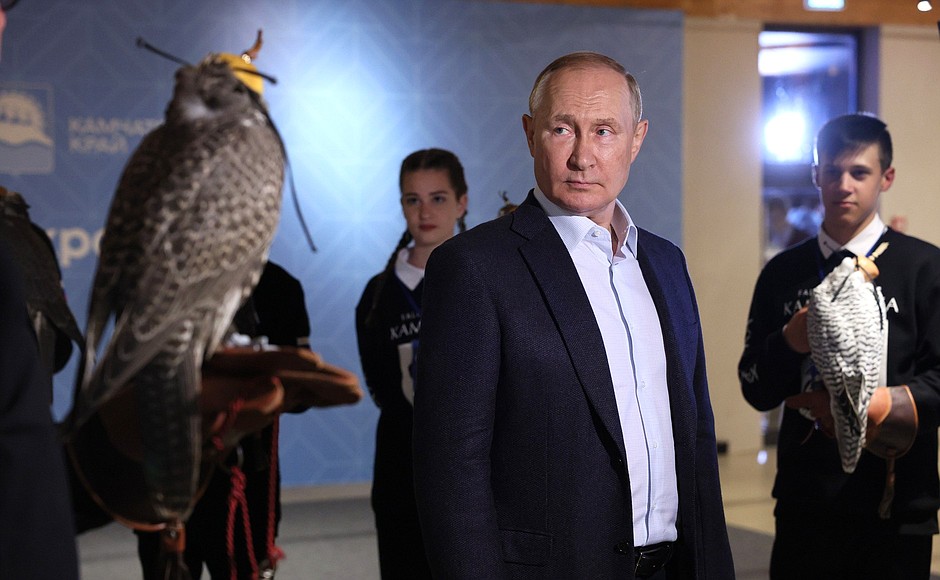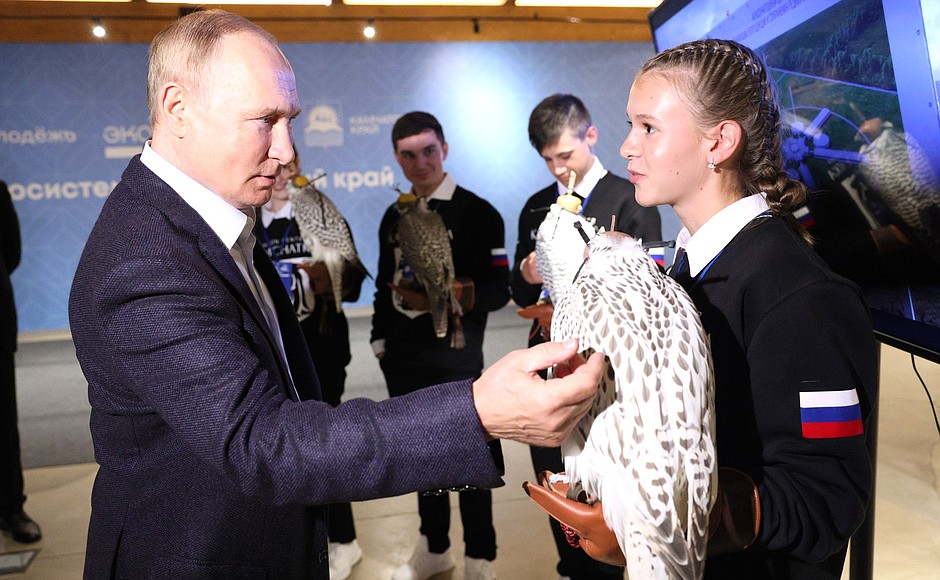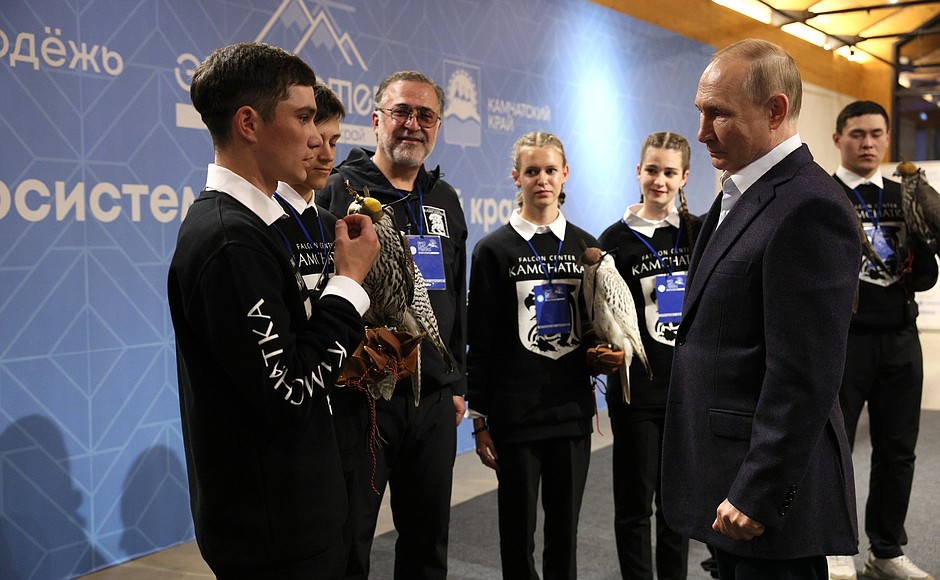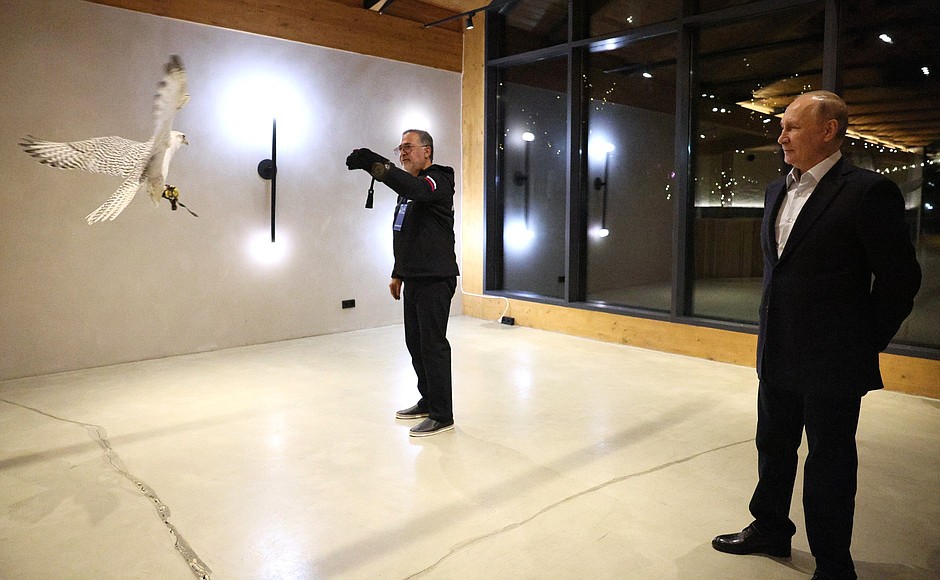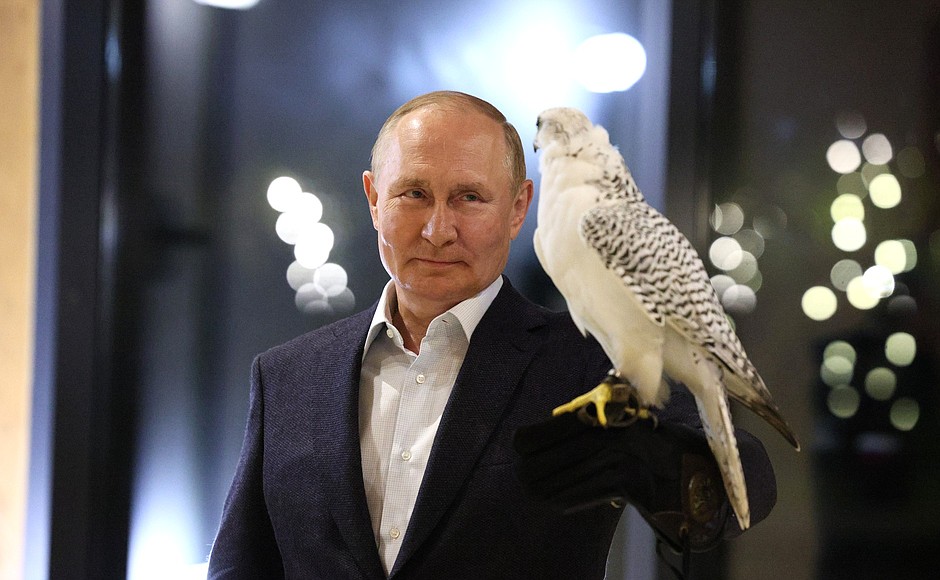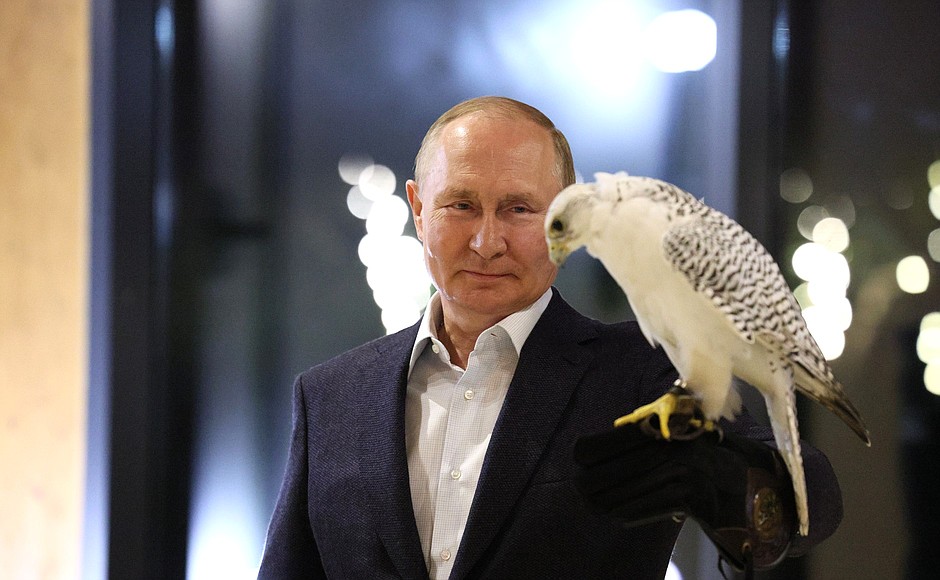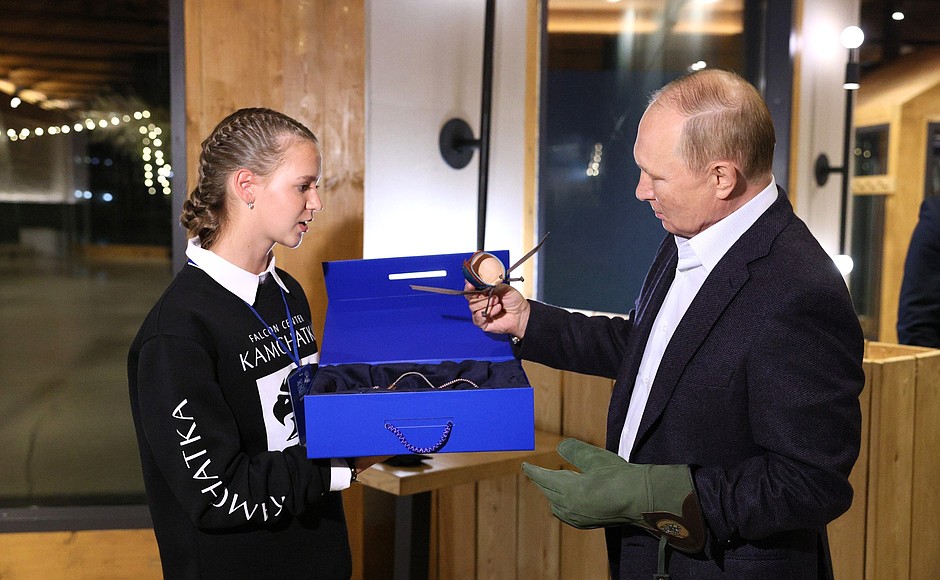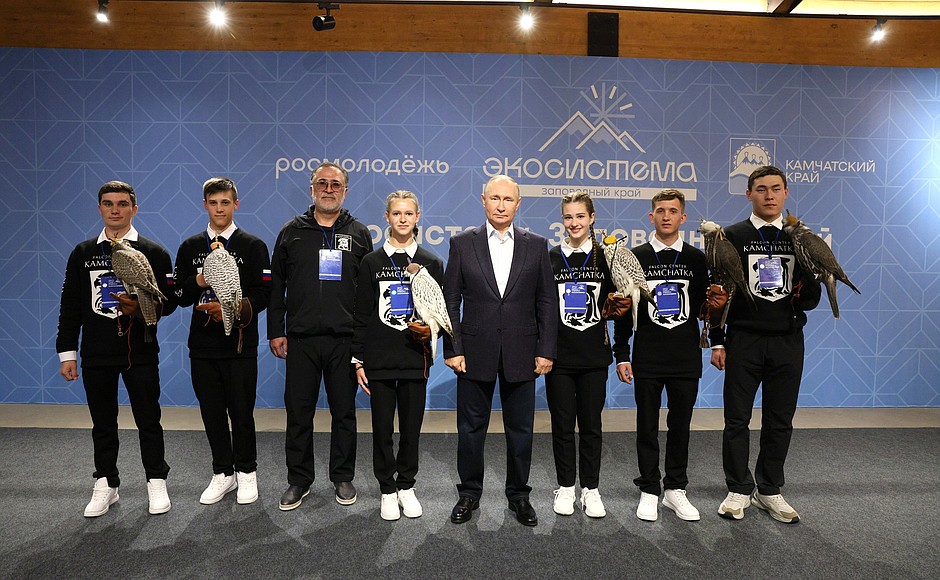Following the meeting, Vladimir Putin was briefed on the activities of the Kamchatka International Centre for the Reproduction and Conservation of Rare Species of Birds of Prey. The centre, in line with the President’s instructions, is operating near Cape Sharomsky in the Milkovsky District, the Kamchatka Territory, and is addressing the disappearance of white gyrfalcons, the most valuable and rare species of the order Falconiformes. The species, protected by the Red Data Book of Russia, has a rapidly declining population, mainly due to poaching. Young ornithologists and the centre’s general director, Shukhrat Razakov, showed the President the skills that the birds had mastered during training and spoke about the success in their breeding.
* * *
Excerpts from transcript of Meeting with participants in Ecosystem: Protected Territory National Environmental Youth Forum
President of Russia Vladimir Putin: Good afternoon, friends.
It is a pleasure to see you all and to be able to greet you and, of course, thank you for doing the work that we will be talking about today. We have gathered to discuss it in more detail.
Obviously, you are not only interested in this work because it is a current trend and because the entire world is concerned about the environment. You are doing this job because you like it and you personally believe that it is important. And you are right. I am not taking about the environment in general: we often hear alarm bells warning that if humankind does not address environmental issues, it might simply cease to exist since it is also part of the environment. This may be true.
There are many debates on environmental issues among those who produce emissions, who are involved in industrial activity, and among those who want to protect both consumers and the whole of nature from the negative impact of human activity. Some speak about inevitable cycles in the universe and on our planet.
See also
At any rate, it is obvious that human activity creates problems. We may come back to this later, however, everybody knows about the huge plastic island in the Pacific Ocean that spans 1.5 million square kilometres. Clearly, it is a result of human activity and we cannot reverse this and nobody who creates such problems can evade accountability. This problem alone causes global issues, not to mention air pollution.
Be that as it may, whether this globally affects the planet’s environment or not, it definitely affects the people who live in those regions and in those cities. Therefore, it is clear that these issues require special attention, and above all, from people who understand these problems and want to make every effort to minimise their impact.
Kamchatka is a special place, a special region. I fell in love with Kamchatka on my first visit. It has a special atmosphere. Well, people who are born here and live here all their lives probably find it all mundane – one gets used to it and takes it for granted.
As you know, I was born and raised in Leningrad, St Petersburg now, and for me, its beautiful embankments, views, its classic architecture of the 17th-18th and later centuries, this amazing harmony, by the way, of natural and human creation – I lived with this and thought people around the world probably lived the same way. When I grew up, I travelled around Russia, mainly to sports competitions, and I realised that was not the case. And my first emotion was shock: I really thought things were pretty much the same everywhere as in Leningrad, St Petersburg. But no, they are not.
The same is happening here. Apparently, when a person lives here and sees this beauty, they assume that, probably, it is the same everywhere, or similar. No, it is not. This is a unique place. Famous writer Vasily Peskov definitely had a reason to write about this, to admire Kamchatka. The animal world here is amazing, and the hills, and mountains, and the ocean – everything is impressive. And of course, it all requires care and protection.
So, first of all, I would like to thank you for doing this. I know that the forum brings together everyone who loves nature and is ready to protect it. And it is the first time it has been held in Kamchatka, right? I would suggest, given the uniqueness of this place, making it a regular, annual event. For my part, I will do everything to support this.
<…>
Vladimir Putin (responding to Artyom Avetisyan’s proposal to revive the movement of young naturalists within the recently created Russian Movement of Children and Youth): By the way, it is a pity that it seems to have come to nothing, this movement of young naturalists. It was a very good movement, very good, kindly, quite professional and well-organised. A lot of enthusiasts worked there, teachers of relevant disciplines helped, and a lot of good things were done as part of the former pioneer organisation. So, I think it is a good idea, a very good one.
You said that this is where Russia begins. In fact, Russia begins with people wherever they live. However, geographically, I think we should speak about Kamchatka. In fact, our neighbours – Japan and the Japanese – are called the Land of the Rising Sun, but I think Kamchatka or Sakhalin lie even further east than Japan. Yet further east is New Zealand, and to the east of New Zealand is Chukotka. And the strait is only 60 kilometres wide, and that is it, next there is the American continent. In this sense, the Land of the Rising Sun is Russia. But, as I have already said, Russia, of course, begins with people, no matter where they live, no matter what territory they live in.
Of course, you choose an amazing area of activity, it is beautiful and endless, especially when you have something to do in Kamchatka.
Your proposal to revive this children and youth movement is amazing. I will try to see it implemented, so that it will not be a passing proposal. I will speak with my colleagues in the regions and in the Russian government.
Artyom Avetisyan: Thank you very much. This is what a line from my favourite poem is about, let me quote: “Russia does not begin with mountains, but with you.” This is exactly what we have talked about.
Thank you very much.
Vladimir Putin: Thank you. Good luck.
<…>
Olga Stepchenko: My name is Olga Stepchenko. I was born and grew up in Nizhny Tagil.
I am engaged in forest issues and I am proud to tell you that our Russian forestry initiatives, such as the Memory Garden and Save the Forest, are the largest such projects in the world in terms of people's involvement.
The forest is something that really excites and unites each of us. That is why we created our Forest Volunteers movement and restored around 100 million trees last year alone.
This year we were the first environmentalists to go to Donbass. We have been to both Lugansk and Donetsk. Now forests are constantly being set on fire there, territories are damaged, animals are suffering and dying, and land reclamation has been disturbed.
But the most important thing I would like to tell you is that there are almost no ecologists there, there is no one to do this work; there are only a few people working in the industry, and only one forester. But he continues to travel around, extinguishing fires and organising help for wounded wild animals right here, on the forest site. We saw it all. When we arrived, he hugged us and cried. My point is that we should start sending young ecologists from Russia to work in Donbass. I am sure I know many would go.
Moreover, after the forum I understood that we are ready and should launch ecological humanitarian missions. They really need this. We want to start training and preparing ecologists who will be able to work there. The republics that have been wounded by shells are a springboard for us to apply the knowledge and skills that we have gained in Russia.
Moreover, Mr President, I would like to tell you that we want to do more than just one-off humanitarian missions, which are certainly important for environmentalists there. But we want to launch and lead the processes that will prevent an environmental disaster in Donbass. To this end, we need your help, support and approval very much. We will not let you down. Thank you.
Vladimir Putin: First of all, I would like to say that the tragedy that is now happening in Donbass is the result of the nationalist, neo-Nazi regime, which seized power by force in 2014 and then launched military operations in Donbass and twice conducted major military operations using heavy artillery, aviation, heavy equipment and so on. This all continues to this day. It is our duty to help those people. Russia is doing this. All our attempts to resolve this problem peacefully failed because of the Kiev regime’s position. Of course, we had to help, and we are helping the people who live in Donbass.
I have to tell you, although it has nothing to do with our topic, I am simply amazed at the courage of those people, including those who are fighting for their homeland on the front line. I assure you, I know what I am talking about, because I flew here after another report from the Defence Ministry leadership about what is going on.
It is not a professional army. Two corps are formed from the local people. They are fighting better than the professional military. They are fighting very courageously, bravely and effectively. But besides such brave and strong-willed people, there are a lot of professionals, kind people who are determined to make positive change in their fields – in art, in education and in environmental protection.
Now, you have mentioned a man who is just as courageous as his countrymen at the front line, who is fulfilling his duty to protect the environment. And of course, we have to assist such people as well, just as in other areas of housing restoration, industrial and agricultural renewal. Of course, we will do that. Thank you for bringing this up.
I know, and you are probably aware, that the regions of the Russian Federation are also providing support to the territories of Donbass. I will advise my colleagues in the regions and the Government of the Russian Federation who are drafting support and assistance programmes in accordance with the requests from these territories. Of course, this area, environmental protection, must also be included in the joint constructive work. We will certainly do so.
<…>
Vladimir Putin (responding to Darya Shpilenok’s question on support for the institution of public inspectors in environmental protection): As for your question – public inspectors and our attitude towards them, it is of course necessary to support this movement. We will certainly do that. Moreover, a resolution has been adopted at the legislative level to expand the authority of public organisations and public inspectors, in this area among others. It is important to establish adequate law-enforcement in this area. We will definitely support this.
It is common knowledge that in Soviet times we had a broad movement of public order volunteers that supported this. Why is this area worse? On the contrary, it is a very narrow and important area of public activity for society and for the state in general. Considering that the things you mentioned exist, like poaching and environmental pollution, there is a need to involve the public in the drive to protect nature.
Sometimes, rarely, but still, when I happen to be in nature, I see examples. I see that campfires are tidied up and tin cans are buried in the ground. There are more and more examples of a careful attitude towards nature. This also shows that we, most people, have increased our level of environmental awareness.
I see examples like this ever more often. I think about people behaving like this with gratitude, though I do not know them personally. I would like to express my gratitude to them (now, spontaneously, so to speak), to thank them for doing this because many of them will hear me.
However, unfortunately, there are also negative examples, and we do need volunteers to counter them. We will support them in every way. No doubt about this.
I will definitely look at this law-enforcement practice and will ask my colleagues in both the regions and relevant central government bodies to pay serious attention to this issue.
Incidentally, this includes material support and organising this work in specially protected areas. This is very important for the economy, for inbound tourism and nature conservation.
Other countries, including our neighbours, have a high level of eco-tourism. It produces significant revenue that is primarily spent on protecting these sanctuaries. But we need to pay more attention to this. The related Government and regional agencies are now focused on this work.
But in developing the economic aspect and eco-tourism, it is important not to create conditions that can harm nature, as is the case sometimes when the rush for money and resources prevails over everything else. It is basically necessary to care for nature and create opportunities for our people to get to know their own country.
<…>
Vladimir Putin (commenting on the remarks by Anastasia Faterina, volunteer leader, Clean Arctic project): What you have just said is important and interesting. You may have noticed that it was my initiative to do large-scale cleanup in the Arctic, as suggested by Sergei Shoigu. I am happy to know that thousands of tonnes of waste are being removed from there. And I am happier still to see young, positive, energetic and knowledgeable people working on this project on an almost professional level.
You have come up with a list of issues. Frankly, and oddly enough, this is the first time I have heard about them. Saying now that we will do this or that would be too shallow of me. I see that the entire legal framework needs attention. The regulatory framework needs to be reworked in the most basic and professional way, something we will do soon. We will definitely do this.
Thank you very much for bringing this to our attention, and thank you for working on this highly important project.
Russia is returning to the Arctic in terms of the economy and in terms of ensuring its national defence and preventing emergencies. The Emergencies Ministry will see its Arctic infrastructure expand. The Northern Sea Route is being developed as well. Several major economic projects, including in the energy sector, are being developed there and some are now operational.
The Arctic environment is fragile and needs special care. Taken together, cleanup efforts and creating favourable conditions to ensure reliable life support, as well as economic, defence and environmental interests, are a daunting task.
Lomonosov famously said that Siberia is Russia’s future. Now, without exaggeration, we can say that the future of Russia is largely connected with the Arctic. The first thing to do is clean the debris left behind by humans over many decades.
Thank you for doing this. I want to thank everyone who is involved. Everything you have just said will be reviewed, and I believe you will see a response.
<…>
Vladimir Putin (Responding to Darya Vosmukhina’s question on the possibility of turning the Russian strategic initiative Spring Clean into an international project): I believe the importance of the problem we are discussing today, and of the issue you raised, definitely calls for international cooperation. It is impossible to do this otherwise. It is not possible to resolve global problems with a local effort, even if noble tasks underlie these efforts.
Therefore, despite the current complications in world affairs, international cooperation in environmental protection will certainly continue just like cooperation in some areas in space and arms reduction. Strange as it might sound, all these things are closely related. Therefore, it is inevitable.
It is also clear that some countries made a big mistake in running ahead and making decisions that were based on noble intentions but were unfeasible and eventually led to unfavourable consequences.
Of course, all of us would like to see fewer emissions in the atmosphere. Isn’t this natural? This is exactly what we have been doing – first in 12 cities, then in 49, then all over the country. I will not list all of our undertakings under the Ecology National Project now. This is an enormous, well funded programme.
Are we opposed to this? No, we are not. But everything must be done in a timely manner. We need to prepare industrial companies for this.
But if you get cheap Russian gas and then cut it off yourself and then switch on everything that was anathema, including coal generation, this is certainly not the best solution to global and other problems in the regions where these decisions are made like this.
Nevertheless, I am confident that international cooperation on ecology and climate protection is needed and will inevitably be restored and continued. I must say that it has not been too disrupted now, either. The political fluff that interferes with the cooperation between specialists will definitely subside and they will continue to work together.
<…>
Vladimir Putin (responding to eco-volunteer Andrei Rudnev who suggested establishing a national youth environmental movement in Russia): You know, we have basically been talking about this since the beginning of our meeting, and it is absolutely obvious – the issues we are discussing today, that you are dealing with, virtually as professionals, are a top priority not only for our country but also for humanity in general. So, you are right in the mainstream, you are engaged in a most important and very interesting endeavor that is worth devoting your life to.
There is a saying (I promised the person who told me this that I would repeat it out loud in public), “You need to live for the sake of what you would die for.” Strange as it may seem, you are engaged in humanitarian, humane activities, but it is worth living for this. Therefore, I will of course support everything you are engaged in. If it is worth creating such a movement – it is possible to think about this as well.
During our discussion today we said that a youth movement, a movement of schoolchildren was established recently. It is also possible to create several branches in this movement that are related in order to avoid scattering all these efforts and to unite them into an integral whole. Maybe, this would help resolve the tasks to which you are devoting your life, at least for now. The presence of such a movement in a large public organisation would infect all the participants in this process with the isues you are working on and that you mentioned.
Let us think it over. It could be done both ways. All right? We will not forget about it, and I will not forget about it and will try to promote this idea along with you.
I would like to finish my remarks with words of gratitude to you for choosing this area of work, and to express the hope that together we will not just clean up the Arctic but will also achieve substantial, tangible results in this effort. I am referring to positive results for the environment in the broad sense of the word and results for the country in general and its individual regions, including the cleaning of reservoirs and rivers in our country. The main goal is to let people in our country feel the results of our joint efforts – through people like you who are dedicated to what they are doing and people who must do this as their professional duty, that is, volunteers, activists and the state. By pooling our efforts, we are bound to achieve the results we all want.
